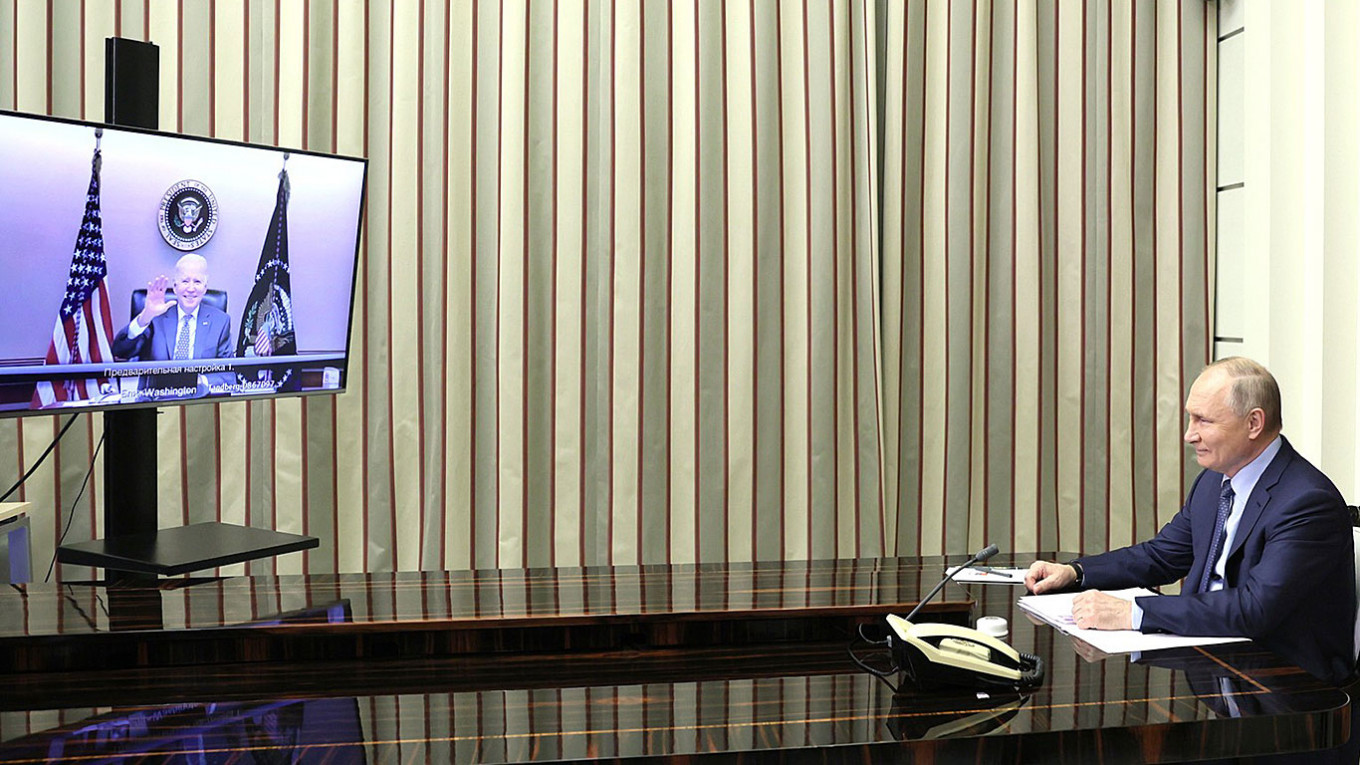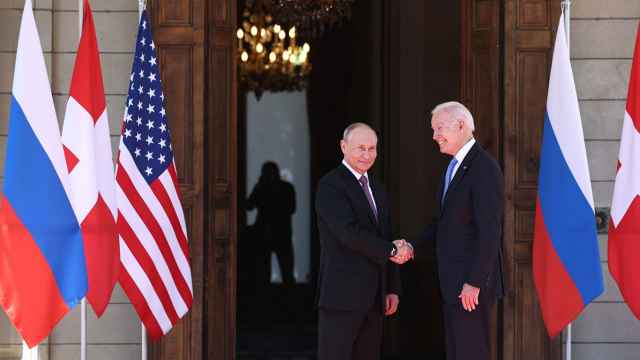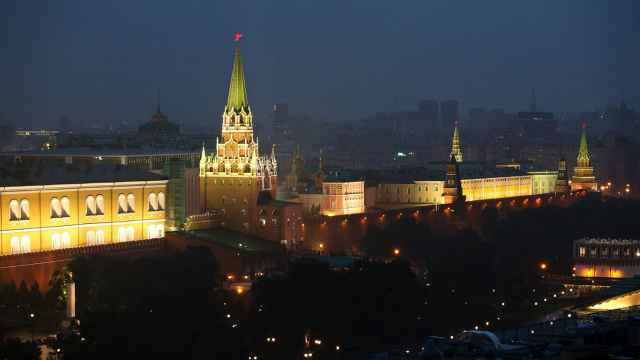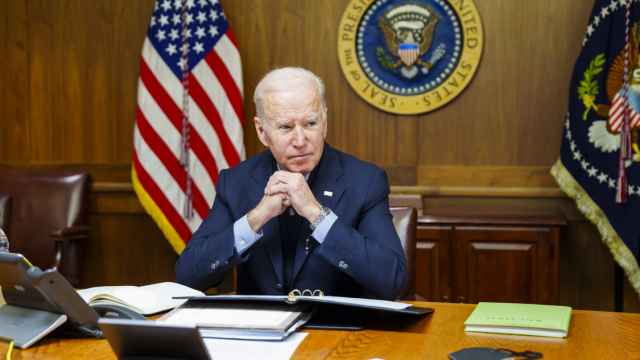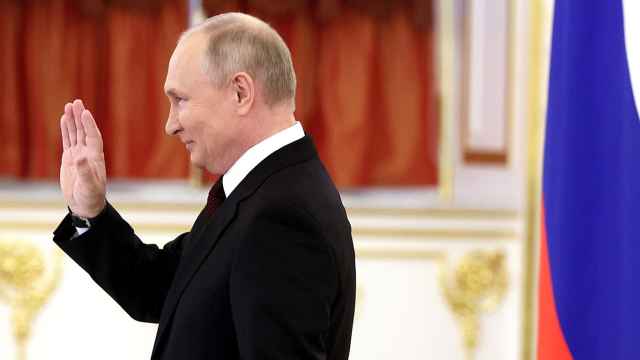Did anyone really think a two-hour video conversation between Presidents Putin and Biden was really going to bring a breakthrough? Of course, it didn’t. Nonetheless, it is worth considering just what such a personal connection can and can’t do.
Of course, all we know about the conversation, beyond the first few seconds, is from the respective sides’ statements, so it’s simply a question of whose spin you want to believe.
Washington’s brief readout struck a minatory tone, saying that Biden “reiterated his support for Ukraine’s sovereignty and territorial integrity and called for de-escalation and a return to diplomacy,” and warning that “the U.S. and our Allies would respond with strong economic and other measures in the event of military escalation.”
While Putin said the conversation was “very open, substantive, and constructive,” Moscow’s own rather lengthier summary offered — unsurprisingly — a rather different interpretation. It said that while “Biden, in turn, focused on what he described as “threatening” movements of Russian troops near the Ukrainian border… Putin warned against shifting the responsibility on Russia, since it was NATO that was undertaking dangerous attempts to gain a foothold on Ukrainian territory, and building up its military capabilities along the Russian border.”
In particular, it emphasized Moscow’s new big-picture demand: that this crisis be resolved not simply with Kiev’s return to the Minsk process in the ways understood by Russia, but also with steps towards the creation of a new European security architecture, starting with “reliable, legally binding guarantees ruling out the eventuality of NATO’s eastward expansion and the deployment of offensive weapons systems in the countries neighboring Russia.”
To some hawks in the West, President Biden’s willingness even to talk to his Russian counterpart was a concession. This is a deeply dangerous contention, as dialogue and diplomacy are precisely at their most valuable with those with whom one disagrees and in times of the greatest tension.
A more reasonable criticism is that nothing new came of the conversation. The various sanctions Biden presumably outlined are unlikely to be different from the options already openly discussed, from extending controls on Russian banks’ access to credit markets to finally blocking Nord Stream 2.
Likewise, Putin does not seem to have offered any new concessions or potential diplomatic solutions. The Kremlin and its usual mouthpieces have been floating the need for some more comprehensive security deal for some time now, and Russian forces are still building up around Ukraine’s borders.
It’s good to talk
However, U.S. National Security Advisor Jake Sullivan affirmed after the event that “there is no substitute for direct dialogue between leaders, and that is true in spades when it comes to the U.S.-Russia relationship” and he is right. It would be a mistake to consider the conversation futile and fruitless.
First of all, whatever was said, the simple fact that there was such a conversation matters. The Kremlin has internalized — and not without reason — that it is only really heard by the Americans when it makes a fuss and creates a problem.
Putin’s people had been pushing for this contact and had it continued to be denied, there would have been a temptation for them to escalate in some way — though certainly not to the level of major military action — simply to make their case more compelling.
Secondly, there is scope for some kind of human rapport. Foreign policy is at once dominated by intractable global processes and also deeply personal. Although there is no prospect of any kind of odd couple affinity as blossomed between Mikhail Gorbachev and Ronald Reagan, for example, perhaps one of Biden’s only particular strengths appears to be his affability.
To the best of my knowledge, no scholar has written specifically on the role of geniality in geopolitics (watch me be proven wrong).
However, if he was able to convey not just toughness but also a genuine desire for dialogue — rather than, as the Kremlin sees it, the usual American assumption of automatic righteousness — then this may, in some admittedly very small way, offset the hawkish chorus Putin has installed around himself.
Finally, as during the Geneva face-to-face summit, the conversation between presidents unlocks further, quieter, more technical discussions by their specialists.
Sullivan noted that the U.S. and its “European allies would engage in a discussion that covers larger strategic issues, including our strategic concerns with Russia and Russia’s strategic concerns” — so long as Russia did not escalate.
Putin clearly has some strange and unhealthy notions about Ukraine and the Ukrainian people that preclude them true agency and sovereignty. He is also by no means alone in believing that the West duped Moscow over NATO expansion, hence his likely unachievable desire for cast iron guarantees about what would, in effect, be the enforced ‘Finlandisation’ of Ukraine.
At the same time, the nature of haggling is that both parties start with extreme bids, expecting to be negotiated towards the middle. It may well be that the gap is unbridgeable, and in any case this is not simply a deal to be struck between Moscow and Washington — it is not for either of them to dispose of Ukraine’s fate.
However, insofar as any diplomatic solution may be achievable, that can only come when both sides talk.
A Message from The Moscow Times:
Dear readers,
We are facing unprecedented challenges. Russia's Prosecutor General's Office has designated The Moscow Times as an "undesirable" organization, criminalizing our work and putting our staff at risk of prosecution. This follows our earlier unjust labeling as a "foreign agent."
These actions are direct attempts to silence independent journalism in Russia. The authorities claim our work "discredits the decisions of the Russian leadership." We see things differently: we strive to provide accurate, unbiased reporting on Russia.
We, the journalists of The Moscow Times, refuse to be silenced. But to continue our work, we need your help.
Your support, no matter how small, makes a world of difference. If you can, please support us monthly starting from just $2. It's quick to set up, and every contribution makes a significant impact.
By supporting The Moscow Times, you're defending open, independent journalism in the face of repression. Thank you for standing with us.
Remind me later.



